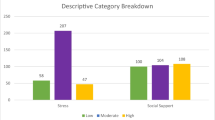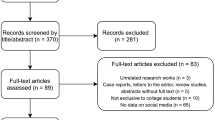Abstract
The purpose of this article is to examine how intragroup marginalization has a potential impact on Latino college students’ psychological adjustment. The concept of intragroup marginalization in this context relates to the perceived rejection of students by persons of their heritage culture group in response to the students’ acculturation efforts in regard to the college culture. Counselors can facilitate college success of Latino students by addressing acculturative stressors. Intragroup marginalization and its relationship to Latino college student adjustment is illustrated and discussed through a vignette.
Similar content being viewed by others
References
Abrams, D., Marques, J. M., Bown, N., & Henson, M. (2000). Pro-norm and anti-norm deviance within and between groups. Journal of Personality and Social Psychology, 78, 906–912.
Benet-Martínez, V., & Haritatos, J. (2005). Bicultural identity integration (BII): components and psychological antecedents. Journal of Personality, 73, 1015–1050.
Berry, J. W. (2003). Conceptual approaches to acculturation. In K. M. Chun, P. B. Organista & G. Marín (Eds.), Acculturation: Advances in theory, measurement, and applied research (pp. 17–38). Washington, DC: American Psychological Association.
Berry, J. W., Kim, U., Power, S., Young, M., & Bujaki, M. (1989). Acculturation attitudes in plural societies. Applied Psychology: An International Review, 38, 185–206.
Bias, J. P., Conoley, C. W., & Castillo, L. G. (2005). Effective responses to teasing. The Childhood Care and Development Journal, 3, 15–39.
Branscombe, N. R., Wann, D. L., Noel, J. G., & Coleman, J. (1993). In-group or out-group extremity: importance of the threatened social identity. Personality and Social Psychology Bulletin, 19, 381–388.
Castillo, L. G., & Cano, M. A. (2007). Mexican American psychology: Theory and clinical application. In C. Negy (Ed.), Cross-cultural psychotherapy: Toward a critical understanding of diverse client populations (2nd ed., pp. 85–102). Reno: Bent Tree Press, Inc.
Castillo, L. G., Cano, M. A., Chen, S. W., Blucker, R., & Olds, V. (2008). Family conflict and intragroup marginalization as predictors of acculturative stress in Latino college students. International Journal of Stress Management, 15, 43–52.
Castillo, L. G., Choi-Pearson, C., Conoley, C. W., Archuleta, D. J., Van Landingham, A., & Pharmourath, M. (2006). University environment as a mediator of Latino ethnic identity and persistence attitudes. Journal of Counseling Psychology, 53, 267–271.
Castillo, L. G., Conoley, C. W., & Brossart, D. F. (2004). Acculturation, White marginalization, and family support as predictors of perceived distress in Mexican American female college students. Journal of Counseling Psychology, 51, 151–157.
Castillo, L. G., Conoley, C. W., Brossart, D. F., & Quiros, A. (2007). Construction and validation of the intragroup marginalization inventory. Cultural Diversity and Ethnic Minority Psychology, 13, 232–240.
Gloria, A. M., & Rodriguez, E. R. (2000). Counseling Latino university students: psychosociocultural issues for consideration. Journal of Counseling and Development, 78, 145–155.
Gloria, A. M., Castellanos, J., Lopez, A. G., & Rosales, R. (2005). An examination of academic nonpersistence decisions of Latino undergraduates. Hispanic Journal of Behavioral Science, 27, 202–223.
Goff, C., Martin, J. E., & Thomas, M. K. (2007). The burden of acting white: implications for transition. Career Development for Exceptional Individuals, 30, 134–146.
Hong, Y., Morris, M., Chiu, C., & Benet-Martínez, V. (2000). Multicultural minds: a dynamic constructivist approach to culture and cognition. American Psychologist, 55, 709–720.
Jetten, J., Spears, R., & Postmes, T. (2004). Intergroup distinctiveness and differentiation: a meta-analytic integration. Journal of Personality and Social Psychology, 86, 862–879.
Kohatsu, E. L. (2005). Acculturation: Current and future directions. In R. T. Carter (Ed.), Handbook of racial-cultural psychology and counseling: Theory and research (Vol. 1, pp. 207–231). Hoboken, NJ: John Wiley & Sons, Inc.
Llagas, C. (2003). Status and trends in the education of Hispanics (NCES 2003–008). Washington, DC: U.S. Department of Education, National Center of Education Statistics.
Murillo, R. (2001). The price of not speaking spanish. Retrieved April 29, 2009, from http://www.west.asu.edu/koptiuch/SBS301_archive/PMEwebF01/Murillo.html.
Myers, H. F., Lesser, I., Rodriguez, N., Bingham Mira, C., Hwang, W., Camp, C., et al. (2002). Ethnic differences in clinical presentation of depression in adult women. Cultural Diversity and Ethnic Minority Psychology, 8, 138–156.
Niemann, Y. F., Romero, A., & Arbona, C. (2000). Effects of cultural orientation on the perception of conflict between relationship and education goals for Mexican American college students. Hispanic Journal of Behavioral Sciences, 22, 46–63.
Organista, K. C., & Muñoz, R. F. (1996). Cognitive behavioral therapy with Latinos. Cognitive and Behavioral Practice, 2, 255–270.
Pizaro, M., & Vera, E. M. (2001). Chicana/o ethnic identity research: lessons for researchers and counselors. The Counseling Psychologist, 29, 91–117.
Quintana, S. M., Vogel, M. C., & Ybarra, V. C. (1991). Meta-analysis of Latino students’ adjustment in higher education. Hispanic Journal of Behavioral Sciences, 13, 155–168.
Rodríguez, N., Myers, H. F., Morris, J. K., & Cardoza, D. (2000). Latino college student adjustment: does an increased presence offset minority-status and acculturative stresses? Journal of Applied Social Psychology, 30, 1523–1550.
Romero, A. J., & Roberts, R. (2003). Stress within a bicultural context for adolescents of Mexican descent. Cultural Minority and Ethnic Minority Psychology, 9, 171–184.
Sodowsky, G. R., Maguire, K., Johnson, P., Ngumba, E., & Kohles, R. (1994). World views of White American, mainland Chinese, Taiwanese, and African students: an investigation into between-group differences. Journal of Cross-Cultural Psychology, 25, 309–324.
Szapocznik, J., Santisteban, D., Kurtines, W. M., Perez-Vidal, A., & Hervis, O. E. (1984). Bicultural effectiveness training (BET): a treatment intervention for enhancing intercultural adjustment. Hispanic Journal of Behavioral Sciences, 6, 317–344.
Tajfel, H., & Turner, J. C. (1986). The social identity theory of intergroup behavior. In S. Worchel & W. G. Austin (Eds.), Psychology of intergroup relations (pp. 7–24). Chicago: Nelson-Hall.
Torres, V. (1999). Validation of a bicultural orientation model of Hispanic college students. Journal of College Student Development, 40, 285–298.
Turner, J. C. (1991). Social influence. Milton Keynes: Open University Press.
U.S. Department of Education (2008). National Center for Education Statistics. Degrees and other formal awards conferred surveys, 1976–77 and 1980–81; and 1989–90 through 2006–07 (IPEDS-C:90–99). Retrieved July 29, 2009, from http://nces.ed.gov/programs/digest/d08/tables/dt08_284.asp.
U.S. Department of Education (2009). National Center for Education Statistics. Digest of education statistics, 2008 (NCES 2009–020), table 226. Retrieved July 29, 2009, from http://nces.ed.gov/programs/digest/d08/tables/dt08_226.asp.
Valdez, J. N. (2000). Psychotherapy with bicultural Hispanic clients. Psychotherapy, 37, 240–246.
Author information
Authors and Affiliations
Corresponding author
Rights and permissions
About this article
Cite this article
Castillo, L.G. The Role of Intragroup Marginalization in Latino College Student Adjustment. Int J Adv Counselling 31, 245–254 (2009). https://doi.org/10.1007/s10447-009-9081-5
Received:
Accepted:
Published:
Issue Date:
DOI: https://doi.org/10.1007/s10447-009-9081-5




